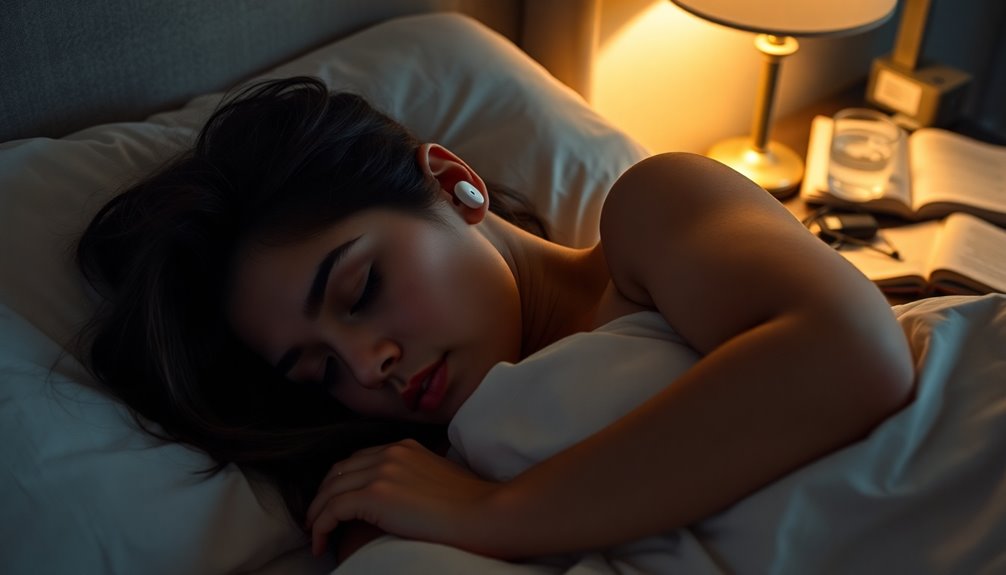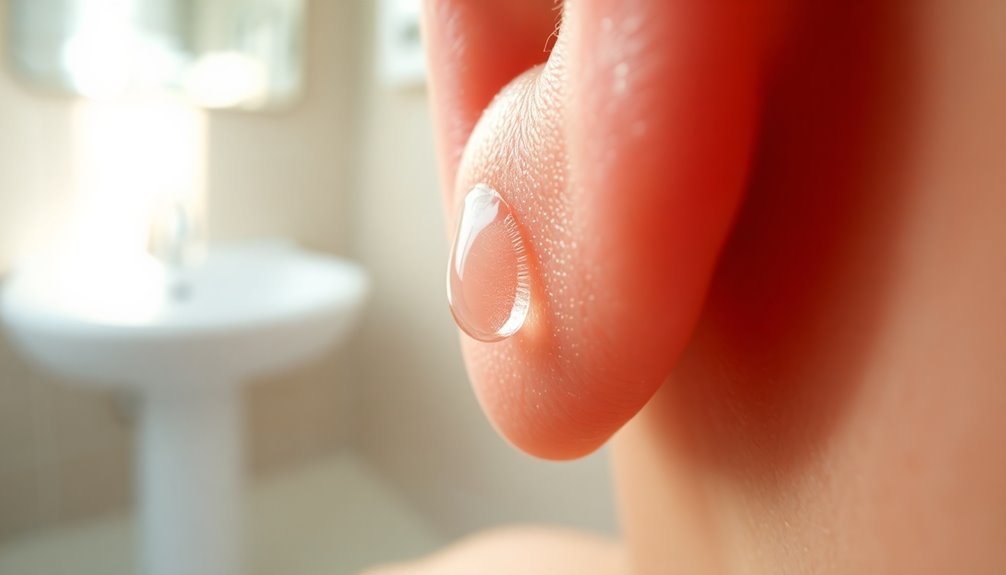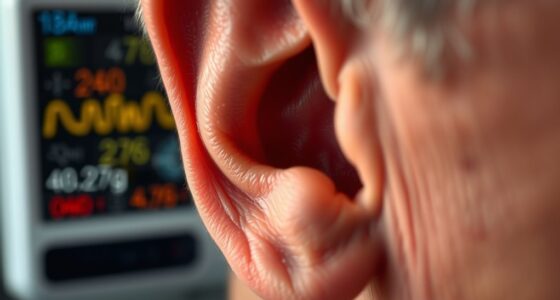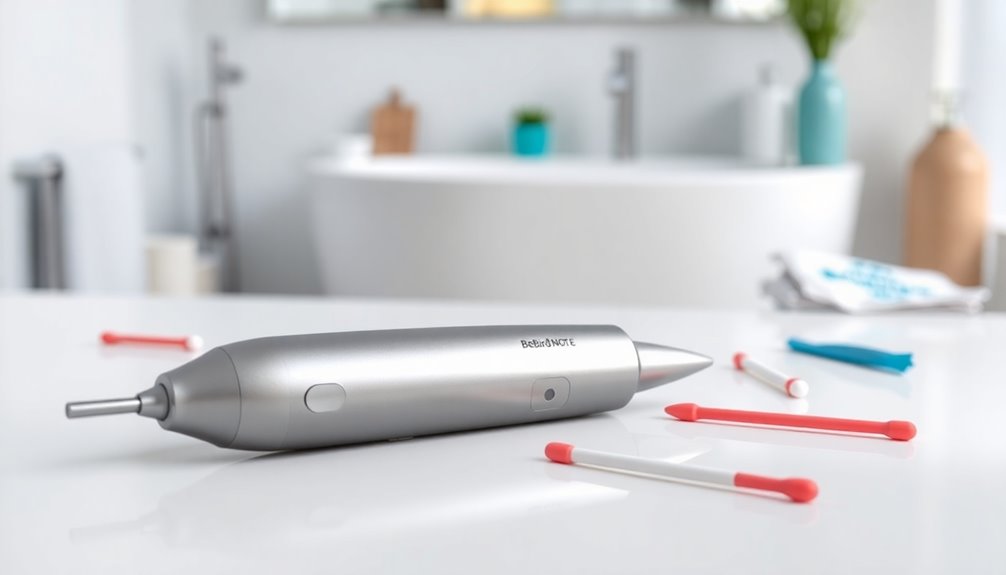Sleeping with AirPods in isn't considered safe due to various health hazards. You risk ear infections from bacteria growth and wax buildup, especially when they're snug in your ears all night. Prolonged use can also lead to noise-induced hearing loss and disrupt your sleep cycles, preventing deep rest. The snug fit might cause discomfort or even injuries if they dislodge during the night. Plus, battery overheating can pose serious risks. While they might seem convenient, it's important to weigh these health concerns carefully. Curious about better alternatives and tips to protect your ear health? There's more to uncover.
Key Takeaways
- Sleeping with AirPods can lead to ear pain, soreness, and a risk of dislodgment, potentially causing injuries during the night.
- Prolonged use disrupts sleep cycles, fragmenting sleep patterns and preventing the brain from entering deep sleep.
- Increased exposure to high volume levels can result in noise-induced hearing loss over time, especially if the volume exceeds 85 decibels.
- The warm environment from extended use promotes bacterial growth, raising the risk of ear infections and chronic inflammation.
- Overnight charging may cause overheating, posing serious health hazards, including burns and potential battery malfunctions.
Ear Health Risks
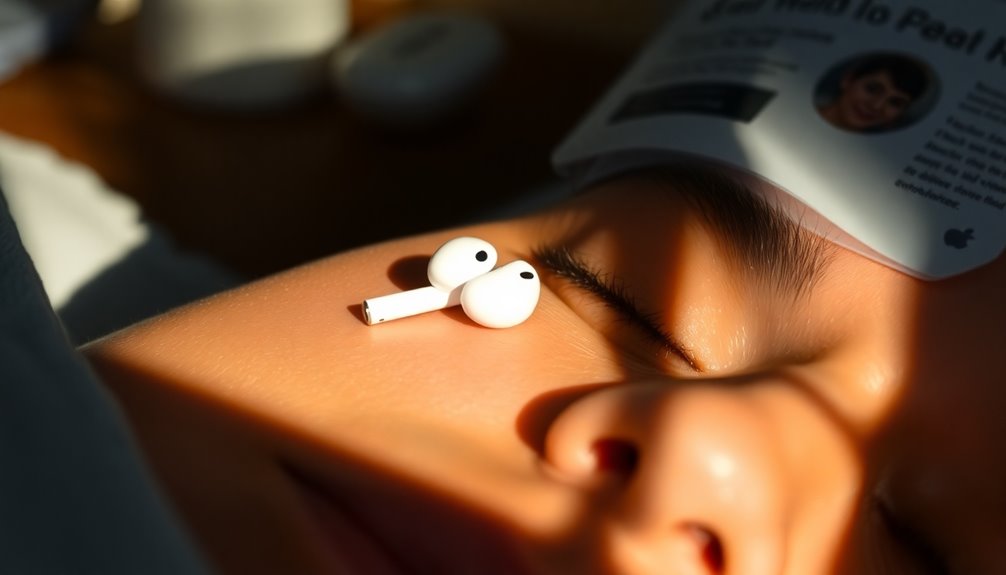
Sleeping with AirPods in can pose several ear health risks that you should be aware of. One major concern is the increased buildup of ear wax. When you wear AirPods, they can push wax deeper into your ear canal, potentially leading to blockages that might require professional removal.
Another risk is the warm, moist environment created by prolonged use during sleep. This setting can promote bacterial growth, raising your chances of developing ear infections. You mightn't notice the discomfort right away, but the pressure from the AirPods can lead to soreness or irritation over time.
It's crucial to pay attention to any signs of pain or discomfort in your ears. Chronic use of AirPods while sleeping can also contribute to issues like Otitis Externa, an inflammation of the ear canal.
To protect your ear health, it's recommended you maintain good ear hygiene and monitor for symptoms of infections. By being mindful of these risks, you can enjoy your music without compromising your ear health.
Hearing Damage Potential
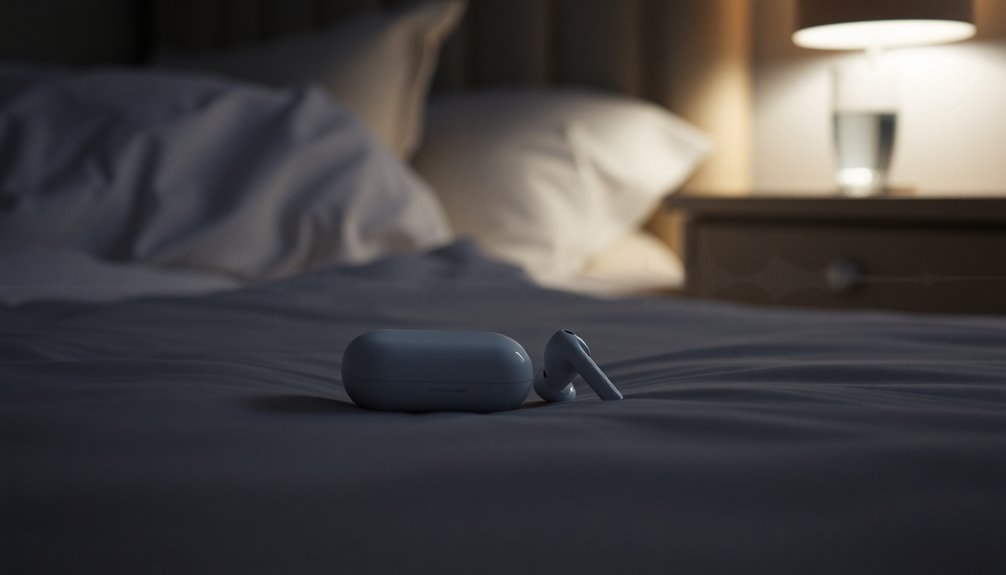
Wearing AirPods while you sleep can also expose you to potential hearing damage. Prolonged exposure to high volume levels, even if you think you're listening at a safe level, can lead to noise-induced hearing loss. Sounds above 85 decibels pose significant risks over time, and you mightn't even realize how loud your white noise is while you drift off.
Even at lower volumes, keeping those earbuds in for extended periods can strain your ears, increasing the risk of permanent hearing impairment. Continuous audio playback during sleep can disrupt your natural sound processing, making it tougher for your brain to differentiate between safe and harmful sound levels.
The World Health Organization recommends regular breaks from earbuds to limit sound exposure, highlighting the importance of being aware of your own volume levels. Many users inadvertently listen at harmful levels while using AirPods during the night, which can lead to long-term issues.
To protect your hearing, consider removing your AirPods before bed or using them only for short sessions. Your ears will thank you in the long run!
Sleep Quality Disruption

Sleeping with AirPods can disrupt your sleep cycles, making it harder for you to enter those essential deep sleep stages.
You might find yourself waking up more often throughout the night, leading to fragmented sleep patterns. This interruption can leave you feeling fatigued and irritable during the day.
Sleep Cycle Interference
Using AirPods during the night can greatly disrupt your sleep cycle, particularly by interfering with the essential REM sleep stage. When you're listening to music as you drift off, you might feel relaxed at first, but the continuous audio exposure can actually prevent your brain from entering deep sleep stages.
This is significant since deep sleep is critical for both physical and mental recovery.
As you rely on AirPods to help you fall asleep, you may find yourself becoming dependent on audio stimuli. This reliance can alter your natural sleep cues, making it harder for you to achieve quality rest over time.
In addition, having earbuds in can heighten your sensitivity to ambient sounds, disrupting the peaceful environment needed for restorative sleep. Moreover, healthy boundaries regarding your sleep environment are important for maintaining optimal rest and well-being.
Fragmented Sleep Patterns
Many people don't realize that keeping AirPods in during the night can lead to fragmented sleep patterns. When you're wearing headphones while you sleep, continuous audio exposure can disrupt your natural sleep cycles. This is particularly concerning when it comes to deep sleep, which is essential for restorative rest.
You might find that the presence of AirPods prevents your brain from fully relaxing, making it harder to drift into those vital stages of sleep. As a result, you could experience increased awakenings throughout the night, leading to a restless experience.
Studies show that prolonged use of earbuds can also interfere with REM sleep, the stage responsible for dreaming and memory consolidation. Ultimately, this disruption affects your overall sleep quality, leaving you feeling fatigued and groggy when you wake up.
If you're relying on AirPods for sleep, you may notice a decline in your mood and cognitive function during the day. Prioritizing uninterrupted rest is key, so it might be worth considering alternatives to wearing headphones overnight. Your mind and body will thank you for it!
Physical Discomfort Issues
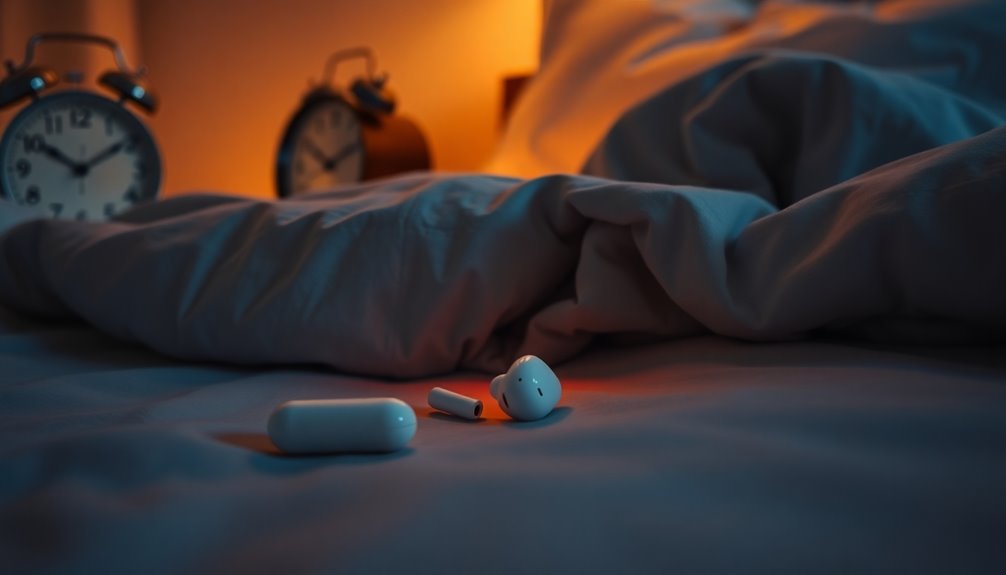
Sleeping with AirPods can lead to ear pain from the constant pressure they place on your ears.
If they dislodge during the night, you might face the risk of injury as they could get stuck in your ear canal.
Over time, this discomfort mightn't only disrupt your sleep but could also result in chronic pain.
Ear Pain Risks
AirPods' snug fit can quickly become a source of discomfort when worn through the night. You mightn't realize it at first, but sleeping with AirPods can lead to ear pain or soreness due to prolonged pressure on your ears.
If the earbuds don't fit properly, it's even worse. The constant presence of these devices can create a sense of fullness or pressure, making it uncomfortable over time.
Here are some risks to contemplate:
- Prolonged use may cause ear pain, increasing discomfort.
- Pressure can lead to soreness, especially if worn too long.
- Continuous use can exacerbate existing ear conditions.
- Restless sleep may result from the discomfort of wearing headphones.
- Neglecting ear hygiene can contribute to chronic pain.
In the long run, wearing AirPods while you sleep can contribute to chronic ear discomfort or pain, potentially causing damage to your ear canal or surrounding tissues.
It's crucial to take breaks and prioritize your ear health. If you often experience discomfort, contemplate adjusting your habits for a more restful night.
Dislodging and Injury
Wearing AirPods through the night can cause them to dislodge, increasing the risk of injury to your ears. While you might find them convenient for listening to music or podcasts, the design can lead to discomfort and soreness, especially if you shift positions during sleep.
This pressure or twisting can result in the AirPods becoming lodged in your ear canal, which could necessitate medical intervention for removal. Dislodging can also lead to injuries in the outer ear or ear canal due to the constant movement while you sleep.
You may not even realize this is happening until you wake up feeling pain or discomfort. The longer you wear them, the greater the potential for irritation, making it harder to get a restful night's sleep. This physical discomfort can disrupt your sleep quality, leading to fatigue and grogginess during the day.
If you already experience ear pain or discomfort, using AirPods at night could exacerbate these issues, putting you at risk for more serious problems. It's crucial to reflect on these factors before deciding to sleep with AirPods in.
Long-term Discomfort Effects
Prolonged use of AirPods during the night can lead to significant ear pain and discomfort. When you're sleeping with headphones, the pressure they exert on your ears can create soreness that lingers even after you wake up.
Over time, this discomfort can become chronic, affecting your overall sleep quality and daily life.
Here are a few common issues you might face:
- Persistent ear pain or soreness
- Increased risk of irritation in the ear area
- Difficulty finding a comfortable sleeping position
- Potential injuries from dislodged earbuds
- Heightened chances of earbuds getting lodged in the ear canal
As your body adjusts to the constant presence of these devices, skin irritation may develop, complicating the discomfort.
Additionally, the struggle to maintain a comfortable position during sleep can lead to restlessness, making it harder to get a good night's rest.
Ultimately, if you continue sleeping with AirPods, you may find that the long-term effects outweigh the benefits, leaving you with lasting discomfort that could have been avoided.
Consider alternatives for a more comfortable and healthier sleeping experience.
Battery Safety Concerns
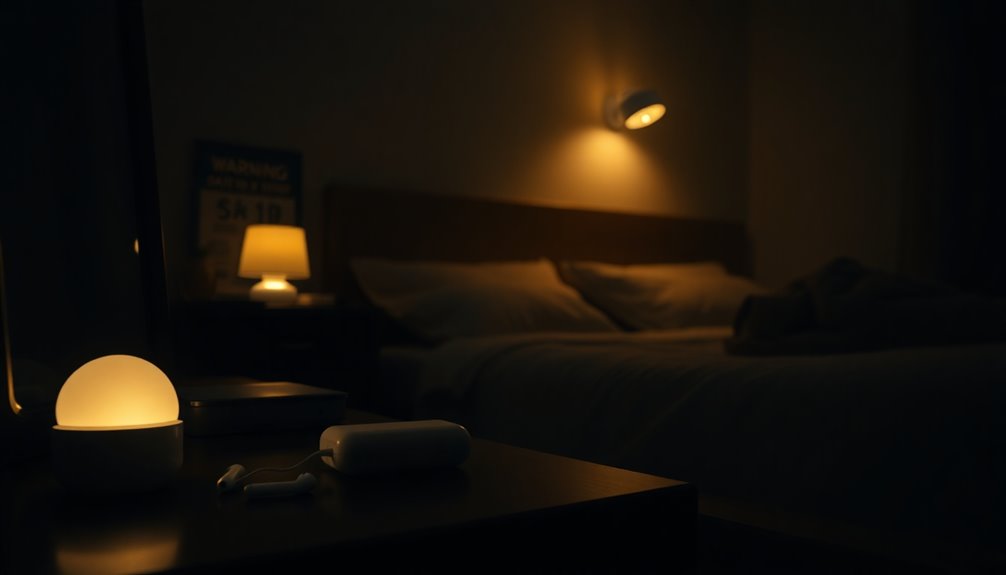
When you settle down for the night with your AirPods in, you might unknowingly increase the risk of battery-related safety issues. One major concern is overheating. If you keep your AirPods charged overnight, they can become excessively hot, which poses serious health hazards. In your sleep, you mightn't notice this overheating, elevating the risk of burns or injuries.
Additionally, if your AirPods are subjected to pressure while you sleep, it can lead to battery swelling or leakage. This not only damages the device but can also introduce potential health hazards from harmful substances. The lithium-ion batteries in AirPods can even catch fire if they malfunction, especially in enclosed spaces like your bed, where you can't easily monitor them.
It's essential to regularly check the condition of your AirPods before use. Any signs of wear or damage signal increased battery safety concerns.
Dependency on Earbuds
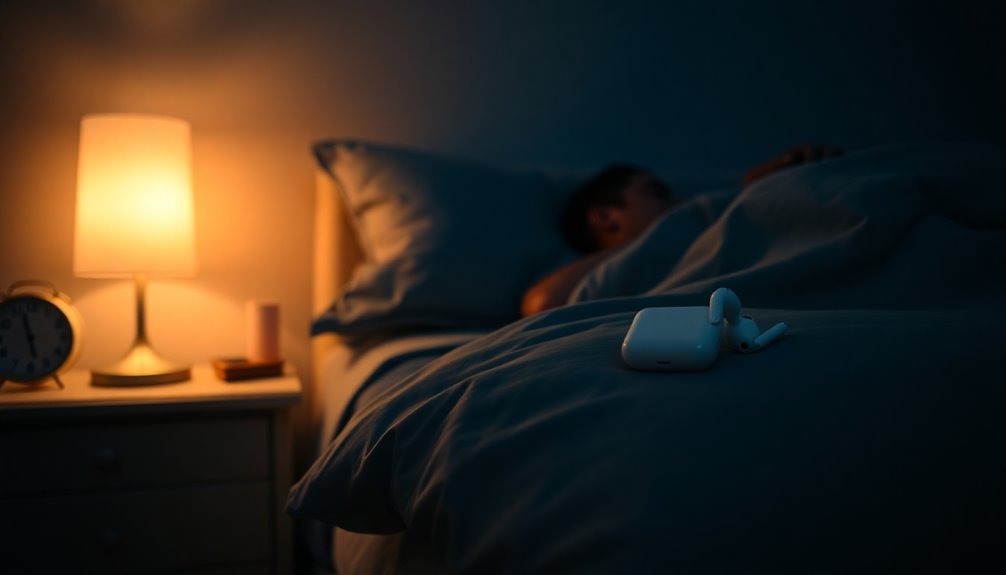
Many users find themselves increasingly reliant on wireless earbuds like AirPods, especially for sleeping. The convenience and comfort they provide make it tempting to use them every night. However, this growing dependency on earbuds can lead to several concerns.
- Soothing sounds help you fall asleep faster.
- You may start to feel anxious without your earbuds.
- Frequent use can cause earwax build-up.
- Prolonged listening can lead to ear-related health issues.
- Your natural sleep cycle might get disrupted.
Studies show that over 50% of young adults use earbuds while sleeping, reinforcing the idea that audio comfort is vital for a good night's rest.
But this dependency on earbuds can interfere with REM sleep, ultimately affecting sleep quality. As you rely more on these devices for rest, you might find it harder to sleep without them.
While they can provide immediate benefits, it's important to recognize the potential long-term effects on your ear health and sleep patterns. Additionally, chronic use of earbuds may lead to increased inflammation in the ear area, which can exacerbate any existing ear-related issues.
Balancing the use of earbuds during sleep is significant to avoid developing negative dependencies that could harm your overall well-being.
Expert Recommendations and Alternatives
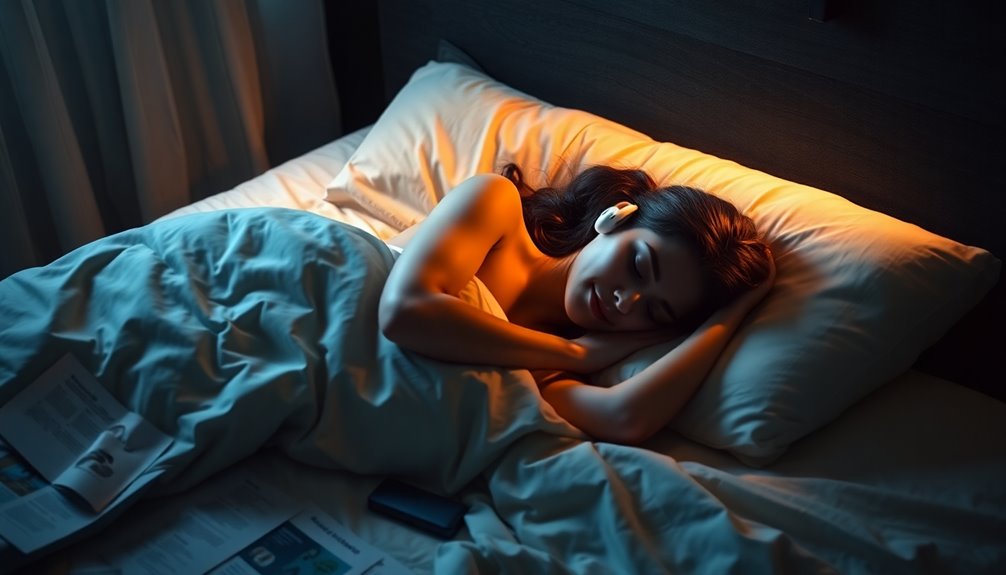
As your reliance on earbuds for sleep increases, it's important to contemplate expert recommendations that prioritize your ear health and overall comfort.
Health experts suggest opting for over-ear headphones instead of AirPods. They provide better comfort and reduce pressure on the ear canal, which minimizes the risk of earwax buildup and infections.
When using any type of headphones or earbuds, keep the volume below 85 decibels to protect against noise-induced hearing loss. Regular cleaning of your headphones and earbuds with antibacterial wipes is essential for maintaining ear hygiene and preventing bacteria growth that could lead to infections.
Additionally, consider alternative solutions like external speakers or pillow speakers for your audio needs during sleep. These options can help you avoid discomfort and the health risks associated with in-ear devices.
Finally, take regular breaks from using earbuds to promote ear health and prevent chronic issues. Giving your ears time to recover from prolonged sound exposure is vital for maintaining their well-being. Moreover, understanding the importance of ear hygiene can further enhance your ear health and prevent complications.
Frequently Asked Questions
Is It Unhealthy to Sleep With Airpods In?
Sleeping with AirPods in can be unhealthy for you. You might experience earwax buildup and increased moisture, which can lead to infections.
If you use them at high volumes, you're risking noise-induced hearing loss. Plus, they can disrupt your sleep cycles, preventing you from getting restorative rest.
The pressure from the earbuds might cause discomfort, and there's also a risk of overheating or malfunctioning, posing potential safety hazards.
Is It Bad to Have Earbuds in While You Sleep?
Sleeping with earbuds in can be like curling up with a warm blanket—comforting, but potentially harmful.
You might find that it leads to earwax buildup and discomfort, disrupting your sleep. Plus, if you listen at high volumes, you risk noise-induced hearing loss over time.
Don't forget that earbuds can block out important sounds, which might put you in danger during emergencies.
Can I Fall Asleep With One Airpod In?
You can fall asleep with one AirPod in, but it's important to take into account a few factors.
While it might help block out noise and aid relaxation, it could disrupt your sleep cycle. You might experience discomfort if the AirPod doesn't fit well or if it presses against your pillow.
Plus, there's a risk of earwax buildup and potential ear infections, so be mindful of the volume and how long you use it.
Are Airpods Bad for Ear Wax?
Yes, AirPods can be bad for earwax. When you wear them regularly, they might push earwax deeper into your ear canal, which can obstruct airflow and lead to buildup.
The warm, moist environment created by prolonged use can also promote bacteria growth, increasing your risk of ear infections.
To keep your ears healthy, it's best to maintain good ear hygiene and limit how often you wear AirPods for extended periods.
Conclusion
So, is it safe to sleep with AirPods in? While they might seem like the ultimate bedtime companion, the potential health risks can be more than you bargained for! From ear health issues to battery concerns, you might be putting yourself in a tight spot. Instead of risking it all for a late-night podcast, consider alternatives like a white noise machine or comfy headphones. Your ears will thank you, and you'll sleep like a baby without the worry!
